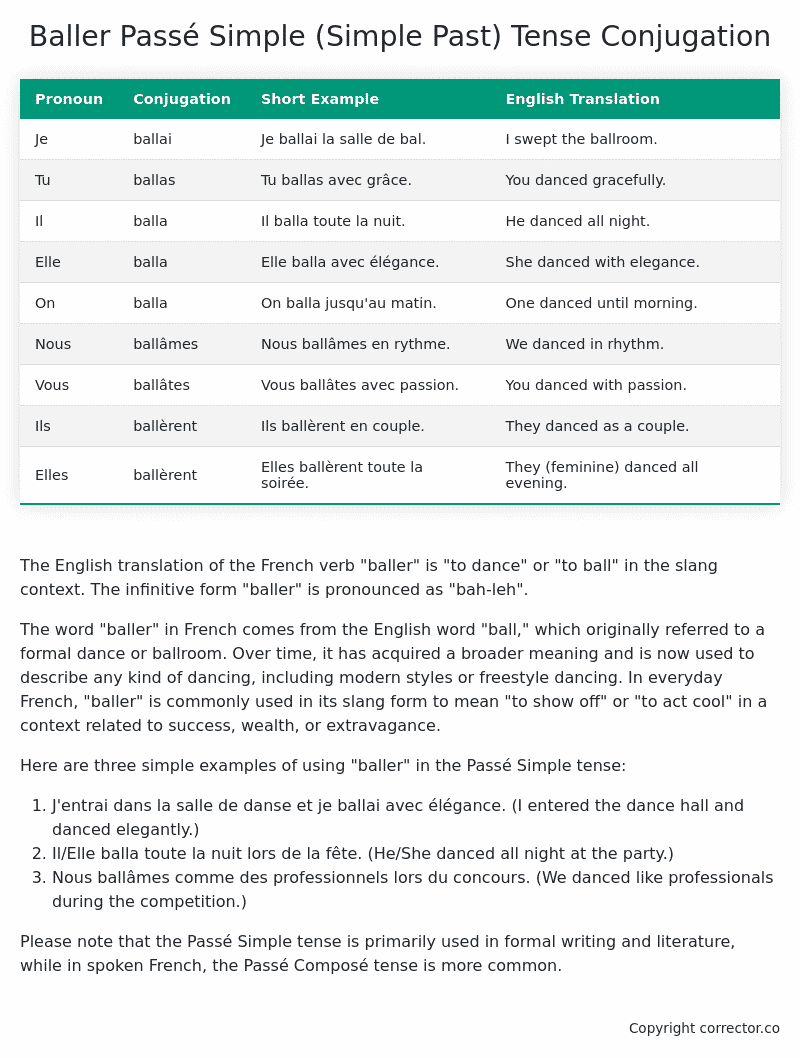Passé Simple (Simple Past) Tense Conjugation of the French Verb baller
Introduction to the verb baller
The English translation of the French verb “baller” is “to dance” or “to ball” in the slang context. The infinitive form “baller” is pronounced as “bah-leh”.
The word “baller” in French comes from the English word “ball,” which originally referred to a formal dance or ballroom. Over time, it has acquired a broader meaning and is now used to describe any kind of dancing, including modern styles or freestyle dancing. In everyday French, “baller” is commonly used in its slang form to mean “to show off” or “to act cool” in a context related to success, wealth, or extravagance.
Here are three simple examples of using “baller” in the Passé Simple tense:
- J’entrai dans la salle de danse et je ballai avec élégance. (I entered the dance hall and danced elegantly.)
- Il/Elle balla toute la nuit lors de la fête. (He/She danced all night at the party.)
- Nous ballâmes comme des professionnels lors du concours. (We danced like professionals during the competition.)
Please note that the Passé Simple tense is primarily used in formal writing and literature, while in spoken French, the Passé Composé tense is more common.
Table of the Passé Simple (Simple Past) Tense Conjugation of baller
| Pronoun | Conjugation | Short Example | English Translation |
|---|---|---|---|
| Je | ballai | Je ballai la salle de bal. | I swept the ballroom. |
| Tu | ballas | Tu ballas avec grâce. | You danced gracefully. |
| Il | balla | Il balla toute la nuit. | He danced all night. |
| Elle | balla | Elle balla avec élégance. | She danced with elegance. |
| On | balla | On balla jusqu’au matin. | One danced until morning. |
| Nous | ballâmes | Nous ballâmes en rythme. | We danced in rhythm. |
| Vous | ballâtes | Vous ballâtes avec passion. | You danced with passion. |
| Ils | ballèrent | Ils ballèrent en couple. | They danced as a couple. |
| Elles | ballèrent | Elles ballèrent toute la soirée. | They (feminine) danced all evening. |
Other Conjugations for Baller.
Le Present (Present Tense) Conjugation of the French Verb baller
Imparfait (Imperfect) Tense Conjugation of the French Verb baller
Passé Simple (Simple Past) Tense Conjugation of the French Verb baller (You’re reading it right now!)
Passé Composé (Present Perfect) Tense Conjugation of the French Verb baller
Futur Simple (Simple Future) Tense Conjugation of the French Verb baller
Futur Proche (Near Future) Tense Conjugation of the French Verb baller
Plus-que-parfait (Pluperfect) Tense Conjugation of the French Verb baller
Passé Antérieur (Past Anterior) Tense Conjugation of the French Verb baller
Futur Antérieur (Future Anterior) Tense Conjugation of the French Verb baller
Subjonctif Présent (Subjunctive Present) Tense Conjugation of the French Verb baller
Subjonctif Passé (Subjunctive Past) Tense Conjugation of the French Verb baller
Subjonctif Imparfait (Subjunctive Imperfect) Tense Conjugation of the French Verb baller
Subjonctif Plus-que-parfait (Subjunctive Pluperfect) Tense Conjugation of the French Verb baller
Conditionnel Présent (Conditional Present) Tense Conjugation of the French Verb baller
Conditionnel Passé (Conditional Past) Tense Conjugation of the French Verb baller
Conditionnel Passé II (Conditional Past II) Tense Conjugation of the French Verb baller
L’impératif Présent (Imperative Present) Tense Conjugation of the French Verb baller
L’impératif Passé (Imperative Past) Tense Conjugation of the French Verb baller
L’infinitif Présent (Infinitive Present) Tense Conjugation of the French Verb baller
L’infinitif Passé (Infinitive Past) Tense Conjugation of the French Verb baller
Le Participe Présent (Present Participle) Tense Conjugation of the French Verb baller
Le Participe Passé (Past Participle) Tense Conjugation of the French Verb baller
Struggling with French verbs or the language in general? Why not use our free French Grammar Checker – no registration required!
Get a FREE Download Study Sheet of this Conjugation 🔥
Simply right click the image below, click “save image” and get your free reference for the baller Passé Simple tense conjugation!

Baller – About the French Passé Simple (Simple Past) Tense
Formation
Usage
Narration
Historical Context
Interactions with other tenses
Passé Composé
Imparfait
Conditional and Subjunctive
Summary
I hope you enjoyed this article on the verb baller. Still in a learning mood? Check out another TOTALLY random French verb conjugation!


